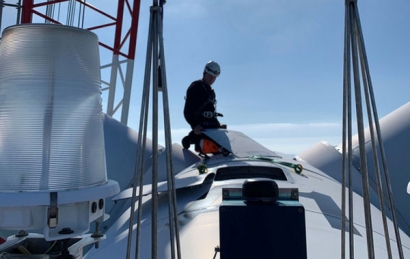
At the time, the wind farm was expected to supply clean energy corresponding to the annual power consumption of 200,000 Danish households.
Exceptionally good location
However, Horns Rev 2 has exceeded all expectations, explains Allan Due Overbeck, Head of Operations at Horns Rev 2:
"Since 2009, the total power generated by Horns Rev 2 corresponds to the annual power consumption of more than 3 million Danish households. Technically, this means that over an 11-year period, Horns Rev 2 can document an exceptionally high capacity factor* of approx. 50 %. This shows that the North Sea holds fantastic wind power potential and, given its size, is the perfect location for offshore wind farms."
At the same, Horns Rev 2 was also the first offshore wind farm to be located so far offshore and in waters with such high waves. Consequently, there was considerable focus on quality and logistics in designing the wind farm right from the outset.
Therefore, the 91 wind turbines are placed in a fan formation to better utilize the wind, and the foundations are constructed of both steel and concrete in order to be able to withstand the extreme conditions offshore. Moreover, it was the first time in history that an accommodation platform was installed in connection with an offshore wind farm.
Horns Rev 2 proved that it was possible to generate offshore wind power on a large scale far from shore, and the experience gained from the wind farm has contributed to reducing the costs of renewable offshore wind energy, so that the European offshore wind projects being decided at the moment are fully competitive with power generated using fossil energy sources.
Overbeck said, "From the very start, we've had to develop new ways of working and organizing the service and maintenance tasks as the wind farm is located about one and a half hours away by boat from the harbor in Esbjerg. Our dedicated and skilled employees help to ensure that we can always maintain a high level of availability, while maintaining high safety standards."
The offshore wind farm produces most electricity in the cold and windy winter months when electricity consumption in Denmark is also at its highest. However, the wind conditions in the North Sea vary greatly from month to month. The current production record was achieved in January 2014 with 135,399,000 kWh, while production during a normal winter month is approx. 90,000,000 kWh.

